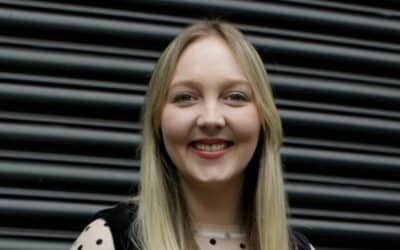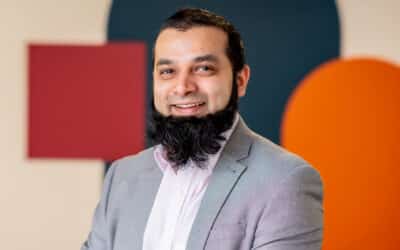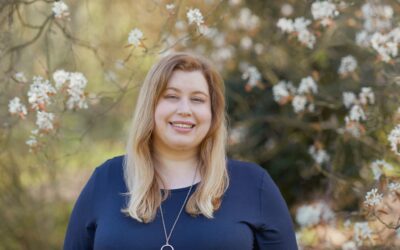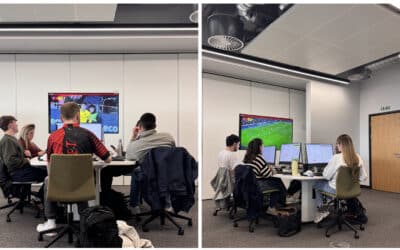Leeds-based Modo25 is a global, in-housing and marketing technology provider. Modo25 is also the team behind the AI-powered marketing platform, ASK BOSCO.
ASK BOSCO is an AI machine-learning platform that helps brands and agencies take control of their digital marketing by aiming to help reduce their online ad spend, make better, data-driven decisions and increase their profits.
Dr Rosie Beeston joined the team back in 2021 as a data scientist, utilising large data sets using machine learning and artificial intelligence as well as classical statistics methods to help solve business problems.
From cosmic dust to data science, Beeston shares her career journey, tips and advice…
How did you first get into your industry?
I did a PhD in Astrophysics studying Cosmic Dust. Since a lot of astrophysical events take much longer than a human lifetime, we essentially only have one timestamp of the universe to draw conclusions from.
This means that we must rely on sophisticated statistics to be able to determine things about how the universe has evolved. Because we have such a strong statistical element in this field, I got a good grounding in how to treat large datasets in a robust way that provides interesting and relevant insights.
All this experience honed my problem-solving skills, and ability to come up with my own interesting questions, visualisations, and solutions – which led me into a career in data science.
What do you love about your job?
The problem-solving aspect is what really drove me to data science. I love learning and applying things I’ve learned to new situations.
Another plus about my job is the people. The kind of people that work in the tech industry are really interested in being bold and trying out new things, since the industry moves so quickly it means that you have to be flexible and smart so you learn a lot from your colleagues, and it can be a dynamic industry to work in.
Who – or what – has inspired you in your career?
I have several inspirations, my mum is fantastic and a wonderful example to me, she always gives 100 per cent, and comes up with ten ideas when other people would have one. She’s not afraid to suggest something a bit mad – there’s always a bit of magic in those ones, and so I never had any inhibitions around sounding a bit “out there”.
My dad was really into amateur astronomy and always getting fascinated by various things and deep-diving into them, so that showed me that it’s totally okay to follow your passions.
My aunty Dr Emma Hodges is one of the most inspiring people I know, she has done so many amazing things. The biggest thing I’ve learnt from her is to just have faith in yourself and your own abilities because if you just give something your all you will surprise yourself with just how much you can achieve. She has done incredible research into caring for patients with dementia and has made a massive impact on so many lives with her work.
Another inspiring person to me is my PhD supervisor Professor Haley Gomez. She is someone I will always look up to, she combined being an incredibly skilled astronomer, physicist, and mathematician with also being an exceptional public speaker and science communicator.
What are the biggest challenges about your job?
What I love about the job is also one of its biggest challenges – the field of data science moves so quickly; that it can be hard to keep up! I think the other thing is that because it is so involved it can be difficult to explain it to people in a way that they can really understand and therefore trust. This is why I always try to build models in such a way that they are easily followed – if you can build a model that makes sense, then half of the battle is won.
The biggest blocker that most data scientists find is getting people to use the tools that they build! To most people, it all sounds like one big black box, and if you can lift the lid a little then people will be more likely to buy into what you’re doing, which is exciting!
What skills have been the most crucial to you succeeding in your career so far?
Statistics! It’s so important to have a good maths grounding.
Creativity – people think that maths isn’t creative, but it really is! Once you get to a level where you have the basics down there is so much creativity in how to use maths, what techniques, etc. People forget that problem-solving is also creativity.
Communication is another key skill, it is something I’m always working on, but you need to be able to explain how and why something works, not just show them an answer.
Finally, the skill of persistence. I think this is maybe the most important, particularly for a PhD. There will be times when it just is a real slog, but you just have to keep going and the reward of seeing the final product or seeing that new feature embedded in the product is so worth it.
What was your first salary and what could someone getting into the industry expect to earn nowadays?
I started working during the pandemic when remote working was a very new concept, so I accepted a pretty low salary for the industry of £36K as I wanted to get going.
There’s no one-size-fits-all-all in the data science sector as different industries will have different standards, and even though you might be doing something just as hard, if you work in a less profitable industry, or for a smaller company you can expect a lower salary.
There are data scientists earning £30K, and others earning multiple six figures. My advice would be to know your worth, both in terms of salary, but also in terms of the kind of work, and the kind of company you would like to work for.
What education or training would be most useful for someone looking to follow your career path?
Getting a PhD in a STEM subject is useful, but certainly an undergraduate degree in a STEM subject. I would suggest either maths or something with a strong statistical component, as well as something where you’re exposed to programming.
What advice would you have for someone looking to follow your path?
Start off by doing a degree that you’re really interested in, it will make it so much easier. You learn a lot by studying something to a high level. Find people that inspire you and ask them for advice. My final piece of advice is to spend time with people who are excited by what they do and build a good network around this.











